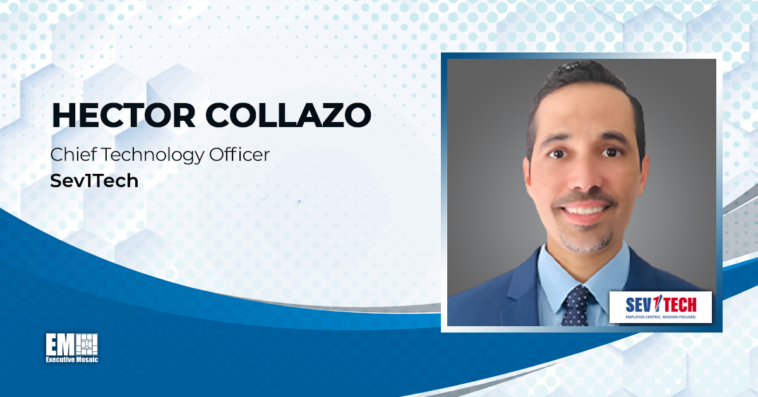Since we last spoke with Hector Collazo, he has been laser-focused on integrating artificial intelligence tools into the strategies of IT provider Sev1Tech, in his role as chief technology officer. Collazo, an engineer by trade who began in telecommunications and eventually transitioned into serving government and defense missions, is excited about Sev1Tech’s scaling of AI. He regards it as “a significant milestone in our organizational evolution.”
The increased implementation of AI for Sev1Tech is inspired by Collazo’s drive to “improve efficiency, elevate capabilities, and cultivate innovation within the company.” In this latest Executive Spotlight interview, Collazo breaks down his current perspectives on AI, explains why it’s a crucial aspect of today’s tech landscape and speaks to the necessity of considering the ethical impacts of the technology.
If you’re a government contractor and you want to explore the field and its applications in the defense and federal markets, it’s imperative you save a spot at the upcoming March 21 AI Summit, from Potomac Officers Club. This annual event is the place lasting connections are made and new insights are uncovered about automated tech. Speakers will join from DARPA, the CDAO, the DOD and beyond.
Where are you seeing opportunities for expansion in Sev1Tech’s portfolio? What new capabilities or markets are you eyeing?
Sev1Tech is strategically positioning itself for expansion by identifying opportunities across several key areas within our portfolio. One notable avenue for growth lies in the realm of emerging technologies, particularly AI and ML. With the increasing demand for intelligent solutions, Sev1Tech is exploring opportunities to integrate advanced AI/ML capabilities into our core services, catering to clients seeking innovative and data-driven solutions. Additionally, we are eyeing expansion in the cybersecurity sector, recognizing the persistent and evolving nature of cyber threats and the need for Zero Trust implementation. Sev1Tech goal is to enhance our cybersecurity portfolio, providing comprehensive solutions to government and commercial clients seeking robust defenses against cyber risks.
As the company navigates the evolving landscape of government contracting, it is actively exploring opportunities in software development, C5ISR and digital transformation. Leveraging our expertise, we aim to support clients in modernizing their IT infrastructure, optimizing workflows and harnessing the benefits of cloud technology and DevSecOps.
In terms of markets, Sev1Tech is looking to broaden its footprint in both federal and commercial spaces. Exploring new partnerships and collaborations, the company seeks to deliver our proven expertise to a diverse range of clients, fostering innovation and addressing evolving challenges. By strategically aligning with emerging technologies, focusing on cybersecurity resilience and diversifying our market reach, we aim to solidify our position as a leading provider of cutting-edge solutions in the dynamic landscape of government contracting.
Tell me about the current state of the artificial intelligence market. Where are you seeing new opportunities in AI, and where do you think the market is heading?
The current state of the artificial intelligence market is driven by unprecedented growth and innovation. As businesses and government agencies increasingly recognize the transformative potential of AI, there has been a surge in adoption across various industries. Key sectors such as healthcare, finance, manufacturing and government agencies are leveraging AI to enhance efficiency, decision-making and customer experiences. Machine learning algorithms, natural language processing and computer vision are among the cutting-edge technologies driving advancements in AI applications.
New opportunities in AI are emerging on multiple fronts. One notable area is the intersection of AI and cybersecurity, where intelligent systems are deployed to detect and prevent cyber threats in real-time. Additionally, the integration of AI in healthcare is revolutionizing diagnostics, personalized medicine and patient care. Furthermore, AI is revolutionizing the modeling and simulation field by significantly accelerating the development of realistic scenarios and improving the accuracy of predictive models. Its ability to analyze vast datasets, simulate complex environments and optimize decision-making processes is fostering breakthroughs in training, research and command and control — or C2 — problem-solving, addressing real-world challenges to keep our nation safe.
Looking ahead, the AI market is poised for continued expansion. Advancements in deep learning, reinforcement learning and AI-driven analytics are anticipated to redefine how organizations extract value from data. The proliferation of edge AI, enabling devices to process data locally, is set to reshape the Internet of Things landscape. Ethical considerations and responsible AI practices are becoming paramount, shaping the industry’s trajectory toward a more inclusive and sustainable future.
In summary, the AI market is dynamic and evolving, with limitless possibilities on the horizon. As innovation accelerates, businesses that strategically harness the power of AI are likely to lead the way in shaping the next era of technological progress.
Can you talk about the importance of AI ethics? Explain why we should be paying more attention to ethical AI.
The importance of AI ethics cannot be overstated, as artificial intelligence continues to be part of every facet of our lives. Ethical considerations in AI are a must to ensure that the deployment and development of intelligent systems align with human values, fairness and societal well-being. As AI algorithms increasingly influence decision-making in critical areas, including the federal government, the potential for bias and unintended consequences becomes a pressing concern. Paying close attention to ethical AI is essential to prevent algorithmic discrimination, safeguard individual privacy and promote transparency in algorithmic decision processes.
In a rapidly advancing technological landscape, the ethical considerations surrounding AI will shape the trajectory of innovation. Emphasizing ethical AI principles is not only a moral imperative but also a strategic approach to building sustainable and inclusive technologies that serve the greater good. As AI continues to evolve, prioritizing ethical guidelines becomes a cornerstone in creating a future where technology enhances human well-being and societal progress, paving the way for future generations.
In which applications are you seeing the highest demand for AI/ML from your federal customers, and can you explain what’s driving that demand?
The highest demand for AI/ML applications from our federal customers is notably concentrated in the cybersecurity and defense sectors. Government agencies are increasingly relying on AI/ML technologies to bolster their cybersecurity defenses, detect and mitigate cyber threats in real time and fortify critical infrastructure. The dynamic and evolving nature of cyber threats requires advanced capabilities, making AI an indispensable tool for identifying patterns, anomalies and potential vulnerabilities. Moreover, in the defense sector, there’s a surge in demand for AI/ML applications to enhance situational awareness, optimize resource allocation and improve decision-making processes. The complexity of modern warfare scenarios and the need for rapid, data-driven insights are driving the adoption of AI to augment human capabilities.
In simple words, the driving demand for AI/ML is the imperative to stay ahead of evolving threats, minimize response times, and improve the overall effectiveness of missions. The potential for AI/ML to analyze vast datasets, automate routine tasks and uncover actionable intelligence aligns seamlessly with the federal government’s mission-critical objectives. In addressing the magnitude and complexity of security challenges, AI/ML applications provide a proactive and adaptive solution as agencies position themselves at the forefront of technology adoption in the federal landscape amid the rise of great power competition.






